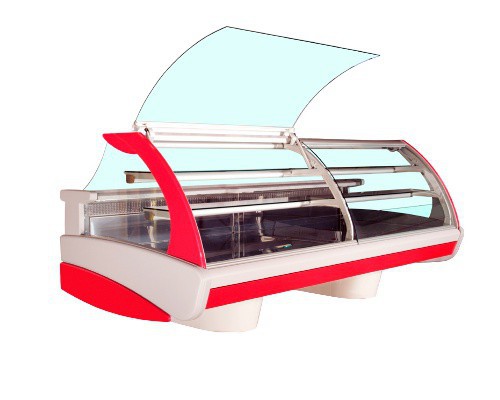Deli and Bakery Refrigerated Cases
If a bakery or deli is part of a larger restaurant, or if the deli also serves as a butcher, then there may be a need for even more refrigeration in the way of a walk-in cooler or freezer. Having access to a variety of refrigeration units to suit your various needs can be both convenient and profitable, reducing waste and improving product quality and shelf life.
What are some common considerations for deli/bakery equipment?
- Refrigerated vs Dry Display Case — Display cases for delis and bakeries often come in a variety of forms, sizes, and qualities. Notably, you may see cases displayed as dry or refrigerated, which is essentially exactly what it sounds like. Dry cases are non-circulating, unrefrigerated shelves and display cases often designed to suit restaurant quality health standards. Refrigerated cases are the refrigerated variant that you often see keeping cakes, pastries, seafood, and deli meats fresh and cool.
- Major cooling types — For refrigerated cases, there are forced air and gravity coil cooling options. Forced air uses fans to circulate cold air around the case, while gravity coil units generate cold air that then falls over the displayed food. Each style has it’s pros and cons, though both are suitable for use in a bakery or deli provided they’re well maintained and fully functional.
- Space required – For a display cooler, you’re going to need a lot of space. But that’s not just for the cooling unit, you’ll want to be sure you choose a size that matches your expected use. Think about how much food will fill the case, how frequently you’ll replace those items, and whether or not you really need the space/volume you’re buying. For many businesses, smaller display coolers are excellent because they cost less and save energy while still having sufficient space for their usual rotation of goods. Refrigerated displays are often a big monetary investment, so be sure to buy what you actually need.
- Other refrigeration equipment — These days, we see a lot of hybrid businesses. Bakeries and delis that also serve prepared food or have additional options that go beyond the usual baked goods or prepared meats. The more expansive your menu or kitchen demands, the more likely you are to want additional refrigeration.
As we mentioned earlier, a butcher’s shop may want a walk in freezer or a bakery that serves lunch may want a reach-in cooler for their various salad or sandwich ingredients. Whatever the case may be, it’s wise to consider when and where you can overlap.
For example, if a business has a walkin freezer, you may not need additional freezer storage in smaller units. Similarly, you don’t want to over stuff limited refrigeration equipment either, as it can reduce the efficiency of the equipment, which leads to more maintenance, more wasted food, and other issues.
Maintaining deli and bakery equipment

Once you’ve invested in any sort of refrigeration equipment for your deli and bakery business, you’ll want to keep that equipment in the best shape possible so it lasts for years to come. That mostly involves regular cleaning and routine maintenance, which will keep your equipment running well. However, even the most well kept equipment will need a bit of professional maintenance.
Significant issues to look out for are the complete failure of any systems or function, constant breakdowns, or always running below the intended efficiency. For example, if you have a forced air style cooler and you notice the fans have stopped circulating air, you might need a more involved solution than turning it off and on again.
Most equipment will come with some sort of manual or instructions for care, which will see you through any commonplace changes or adjustments to performance. Of course, considering that these machines are often calibrated to specific temperatures and have relatively complex inner workings, it’s best to trust the professionals when something is seriously wrong. Working with the system is both about resolving any mechanical issues from wear and use, as well as managing the systems settings to ensure that it runs the way it’s meant to run.
Where to find professionals
If you’re experiencing any of these issues with your own deli and bakery refrigeration equipment, we can help. Our professional team of refrigeration technicians in Austin offer a range of commercial refrigeration services. Get in touch to speak to one of our refrigeration experts today.
Related posts

Floral refrigeration units are an excellent way for florists to preserve and display the arrangements they spend so much time putting together. Between bulk shipments and display arrangements, florists typically have a lot of stock to manage at any given time. As flowers tend to lose their freshness and wilt fairly quickly without regular upkeep, a refrigeration system may help. Of course, there’s a wide variety of styles designed to match different applications throughout a floral business. From…

If you’re like a lot of other bar and restaurant owners, scoping out your walk-in coolers and other food prep equipment probably only crosses your mind once a year or so. In the past, this was always thought to be the “rule of thumb”, so we can’t say we blame you - but nonetheless, we’re also encouraging you to take another look at your maintenance routine (or lack thereof). Regularly scheduled maintenance and inspection can go a long way to keep your business functioning at optimum levels.…

Finding the right location for your business is step one, but after you’ve settled on the perfect spot - you’ll need the equipment to match! Or, maybe you’ve been in the right spot for a while now and are looking for an upgrade (or “downgrade”) to some equipment that is more suitable for your operation. No matter what your situation, there’s a lot to keep in mind, most of which will be unique to you and your restaurant. In this post, we’ll fill you in on some of the more universal information. Making…
